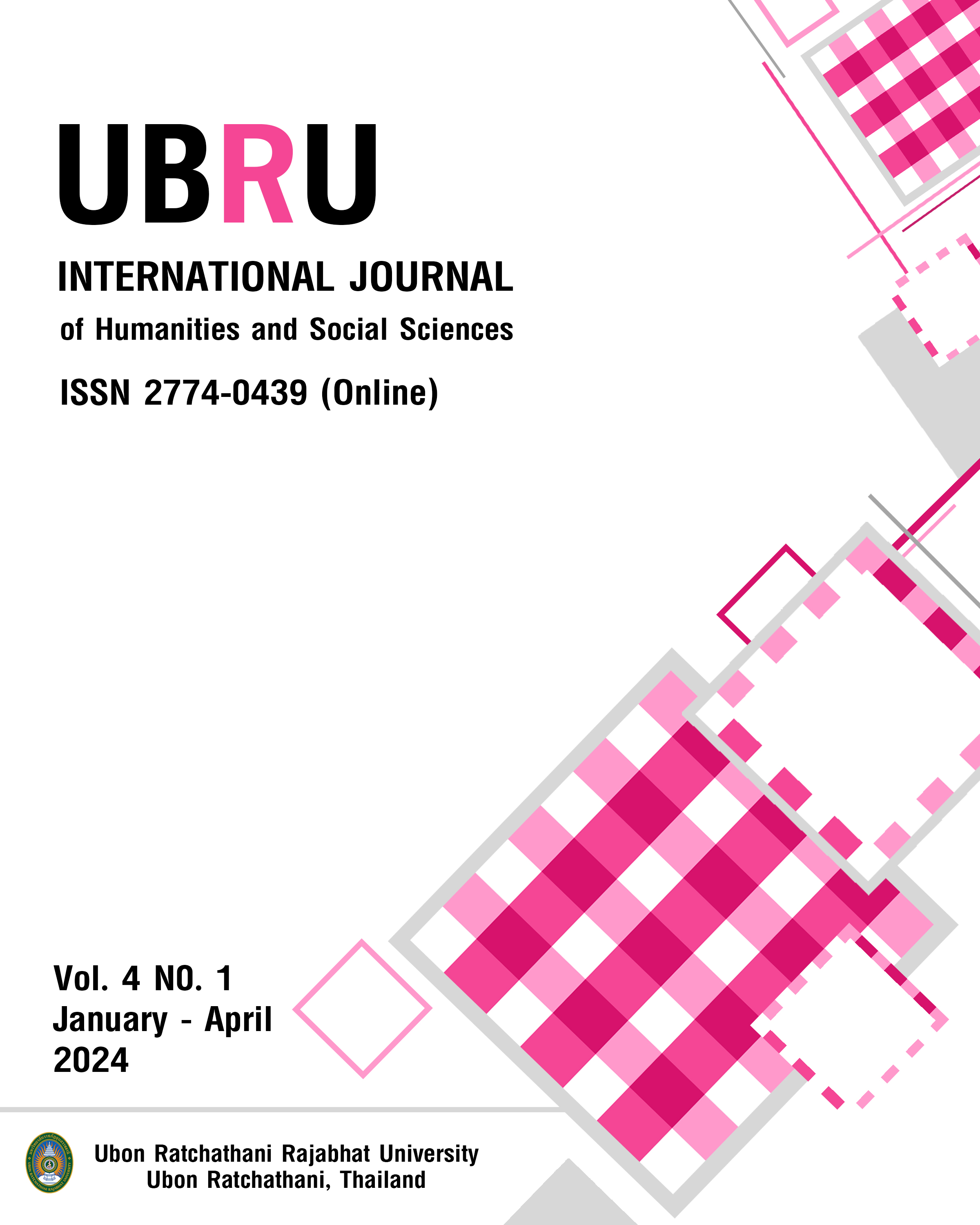The Perceived Benefits, Ease of Use, Attitudes, and Reference Group Conformity Influencing the Intention to Use Mobile Banking Services Among Elderly Customers in Ubon Ratchathani Province: A Study of Government Savings Bank
Main Article Content
Abstract
This research aims to 1) to study the factors related to perceived benefits, perceived ease of use, and reference groups that influence the intention to use mobile banking services of the Government Savings Bank among elderly customers in Ubon Ratchathani Province;
2) to examine the influence of perceived benefits and perceived ease of use on the intention to use mobile banking services through attitudes; 3) explore the impact of perceived benefits and perceived ease of use on attitudes. The sample population consists of 500 elderly individuals using mobile banking services in Ubon Ratchathani Province, selected through probability sampling using a stratified sampling method. The questionnaire was the research tool used. The findings reveal that 1) perceived benefits and reference groups significantly influence the intention to use mobile banking services among the elderly in Ubon Ratchathani Province at a 0.01 significance level, whereas perceived ease of use does not have a significant effect;
2) perceived benefits and perceived ease of use significantly influence the intention to use mobile banking services through attitudes at a 0.01 significance level; 3) perceived benefits and perceived ease of use significantly affect attitudes at a 0.01 significance level.
Article Details
References
Ajzen, I. and Fishbein, M. (1980). Understanding attitudes and predicting social behavior. New Jersey: Prentice-Hall
Ajzen, I. and Fishbein, M. (1991). The theory of planned behavior. Organizational Behavior and Human Decision Process, 50(1), 79-211.
Amornrattanakij, T. (2017). Factors Affecting Customer Intension to Use Standardized Quick Response Codes On Mobile Banking in Bangkok. Independent Study, Master of Business Administration, Faculty of Commerce and Accountancy, Thammasat University.
Bank of Thailand. (2023). Payment transactions via Mobile Banking and Internet Banking services. (online) (May, 24 2023) from http://surl.li/jmagr
Baron, R. M. and Kenny, D. A. (1986). The moderator–mediator variable distinction in social psychological research: Conceptual, strategic, and statistical considerations. Journal of Personality and Social Psychology, 51(6): 1173–1182. DOI: 10.1037//0022-3514.51.6.1173
Boonyathawornchai, W. (2020). Attitudes and Services Affecting on the Dietary Supplement Consumption Behavior of the Elderly in Bangkok and Metropolitan AREA. 15th. RSU National Graduate Research Conference. 2020(15), 895-908.
Bothma, M. and Mostert, L. (2023). “Adopting the technology acceptance model: A Namibian perspective,” South African Journal of Information Management. 25(1), 1-10. https://doi.org/10.4102/ sajim.v25i1.1624
Davis et al. (1989). User Acceptance of Computer Technology: A Comparison of Two Theoretical Models, Management Science, 35(8): 982-1003. DOI: 10.1287/mnsc.35.8.982.
De Leon, M.V. (2019). Factors influencing behavioral intention to use mobile banking among retail banking clients. Jurnal Studi Komunikasi, 3(2), 118-137. doi: 10.25139/jsk.3i2.1469
Fishbein, M., & Ajzen, I. (1975). Belief, Attitude, Intention, and Behavior: An Introduction to Theory and Research. Reading, MA: Addison-Wesley.
Government Savings Bank. (2023). about the bank, bank information, organizational structure. (online) (April, 25 2023). From https://www.gsb.or.th/media/2023/02/ 2566-2570-ITA-2.pdf
Hair, J. F. et al. (2010). Multivariate data analysis. Upper Saddle River, New Jersey-Hell
Nimngen, S. (2020). Generation and the behavior of receiving news through various media. (online) (May, 21 2023). from https://www.prd.go.th/th/file/get/file/20201201801 ba5d82db9dfa27db089 b41c8f138a113752.pdf
Panichkul, W. (2020). Technology Acceptance and Intention to use Mobile banking Application of the elderly in Bangkok. Master of Business Administration, Department of Management, Faculty of Business, Dhurakij Pundit University.
Post Today. (2021). Is Thailand ready with the step towards a completely aging society. (online) (April, 24 2023) from https://op.mahidol.ac.th/ga/wp-content/uploads/author/posttoday-22.pdf.
Tanurak, W. (2017). The Influence of Attitudes Toward Usability and Related Factors on the Intention Behaviors of Thai Wholesale and Retail Industry Employees in Using Technology. Journal of the Association of Researchers. 22(1), 41-53.
The Bureau of Registration Administration (BORA) (2023). Official statistics registration systems Changwat. (Online) (April, 25 2023). from https://www.bora.dopa.go.th/exec-stat/
Tian, Y. et al. (2023). Moderating Role of Perceived Trust and Perceived Service Quality on Consumers’ Use Behavior of Alipay e-wallet System: The Perspectives of Technology Acceptance Model and Theory of Planned Behavior,” Hindawi Human Behavior and Emerging Technologies, 2023(1), 1-14.
Weng, F. et al. (2018). A TAM-Based Study of the Attitude towards Use Intention of Multimedia among School Teachers. Appl. Syst. Innov, 1(36), 2-9. Doi:10.3390/asi1030036
Yamkleepbua, C. (2022). Influence on Technology Adoption and User Trust Affects The Intention to Buy Products VIA Electronic Commerce (E-Commerce) Case Study LAZADA. Independent Study, Master of Management, College of Management, Mahidol University.


